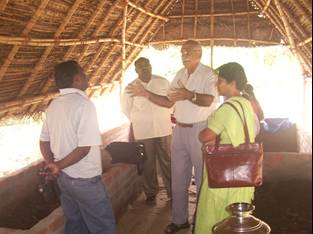| In Harmony with Mother Earth FONDATION ENSEMBLE AND CLEAN-India have come together to demonstrate community actions towards a life in consonance with nature
t is an accepted fact that environment is assuming critical importance in the daily lives of human beings and their interaction with the surrounding fauna and flora. It is an equally disconcerting reality that humans have become the greatest threat to environment by their reckless exploitation of earth’s resources including, its biodiversity. We are overdrawing ground water and not conserving what we get as rain; denuding forests; contaminating water, air and soil with harmful chemicals; not utilizing our waste by turning it to wealth and indulging, in environment degrading activities without realizing its consequences. We blissfully continue with our cultivated NIMBYS (Not in my back yard syndrome) and we do not behave as responsible citizens who have to care, not just for individual households, but also for the environmental well being of our community - locality, city, state and the country. One routinely hears complaints of the municipality not doing its job, the Jal Board not providing us 24 x 7 clean drinking water, the electricity department having frequent power breakdowns and load shedding, the government not looking after the health of its citizens and so on. But little thought is given to our own contribution to Mother Earth, though we proudly proclaim our culture is based on life in total harmony with nature. These aspects are now being addressed by Development Alternatives with support from Fondation Ensemble (FE), a French foundation, which is funding community actions in addition to the CLEAN – India Programme. Community Action on Environment and Sustainable Development in India Project (FE-CAESD) sponsored by FE is an action oriented project in conjunction with the CLEAN-India Programme and it takes care of critical major and minor activities in the urban sector. The strategy is to set up demonstration models in each of the 29 towns covered by CLEAN-India along with some actions in 49 other satellite towns. This would lead to sustainability and the models could then be replicated after more communities are motivated. The major and minor actions to be executed on the ground are: Major Actions n Rain water harvesting n Solid waste management to include vermi-composting, vermi++ (enzyme based technology), aerobic composting and city farming (growing vegetables on terraces using household kitchen waste) n Water purification system using Jal TARA slow sand filter n Waste paper recycling Minor Actions v Tree plantation v Drainage in slums v Soak pits near hand pumps v Eco-lawns v Septic tanks in urban slums As the project required involvement of all stakeholders it was imperative that the district administration get fully involved and provide administrative, infrastructural, manpower and if available, financial support. The project staff are making concerted efforts to meet officials like the District Collector, Municipal Commissioner, Forest Conservator, Jal Nigams and other civic agencies. It was also essential to ascertain the environmental concerns of the communities for their cooperation and involvement. Objectives The overall objectives of the programme are: n Mobilising communities to undertake environmental improvement actions at the local level especially in peri-urban and slum areas. n Creating large scale sustainable interactions for improved access to safe drinking water, waste utilization, tree plantation and other environment improvement activities. n Promoting and implementing best practices of Eco-sanitation in community groups. n Building on success stories for others to emulate and benefit. n Motivating all stake-holders for a concerted effort to make towns clean and green. Outputs At the end of two years, the outputs envisaged with support from Fondation Ensemble would include: n 554 instances of effective environmental actions at the community level with implementation of (16) good practices for water and sanitation throughout 78 cities and towns of India. n Establishment of a network of about 800 community groups in 78 cities and towns, who would be aware of the status of water and sanitation concerns and possible ameliorative actions in their local environment. n Establishment of a network of environmentally conscious and trained 680 teachers, 13600 students per year in 340 schools and 58 NGO coordinators. They would be the master trainers leading to multiplier effect. n Reliable environmental, quality baseline information including seasonal maps regarding water quality and lists of priority issues in water and sanitation over a period of two and a half years. n Packages for community clean-up of environment - kits for water monitoring, action booklets, information and communication materials. Conclusion FE (CAESD) Project has been a boon to the CLEAN-India Programme in providing financial inputs to augment environment impovement activities in the selected towns. The aim is to set up replicable models which would lead to large scale implementation by the communities well before environmental calamities can take their toll. q Col. Valmiki Katju vkatju@devalt.org |

